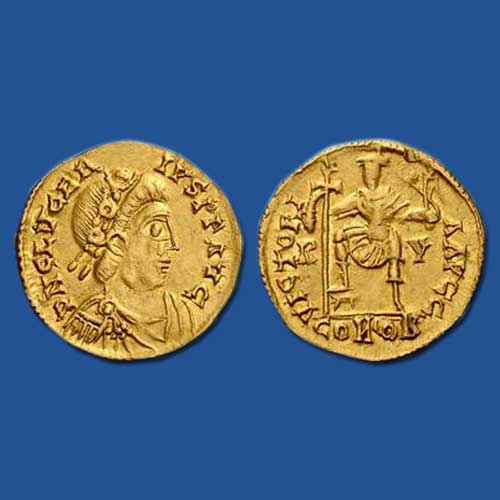Glycerius nominated Western Roman Emperor
2020-03-03 Tue
Glycerius was Western Roman Emperor reigning from 473 to 474. Today on 5th March, 473, Glycerius was made emperor by Gundobad, the nephew and successor of the powerful western general and kingmaker Ricimer.Before becoming emperor, he served as commander in Dalmatia and commander of the Imperial Guard in Ravenna. Glycerius was not recognized as a legitimate ruler by the Eastern emperor, Leo I, who sent a fleet commanded by Julius Nepos against him.
Glycerius was without allies, because Gundobad had left to rule the Burgundians, and therefore was forced to abdicate on 24 June 474. He was appointed Bishop of Salona, which position he held until his death.
It is believed that Glycerius primarily reigned from northern Italy, as all but one coin found from his reign were minted in either Ravenna or Milan. Depicted here is a gold Solidus issued under his reign from Ravenna or possibly a Visigothic mint. The obverse of a coin depicts the Rosette diademed draped and cuirassed bust. On the other hand, the reverse of a coin engraved Emperor standing holding long cross in right hand and Victory on globe in the left hand. Foot on step and COMOB in exergue.
Image Source: https://www.acsearch.info/
Latest News
-
Malwa Sultan Mahmud Shah Silver Coins
2025-09-11 ThuMalwa Sultan Mahmud Shah minted silver coins in round and square flans. <br><br> For round coins,...
-
Malwa Sultan Mahmud Shah Billon coin
2025-08-26 TueMalwa Sultan Mahmud Shah's billon coins followed three weight standards: 100 rati, 96 rati, and 80 r...
-
Fascinating Archaeological Facts on Postage Stamps - 91
2025-08-23 SatRhinoceros is one of the oldest land mammal species existing in India. There are five species of rhi...
-
Fascinating Archaeological Facts on Postage Stamps - 90
2025-08-23 SatUthiramerur, a Village in Kanchipuram, Tamil Nadu, is notable for its Temple inscriptions that descr...
-
Fascinating Archaeological Facts on Postage Stamps - 89
2025-08-21 ThuThe term “millet” is derived from the Latin word “milum,” which translates to grain. millets...

